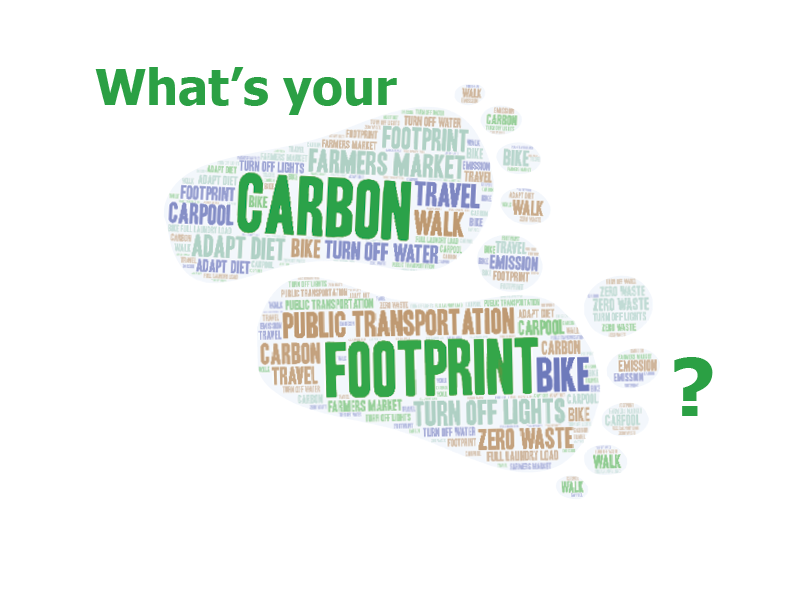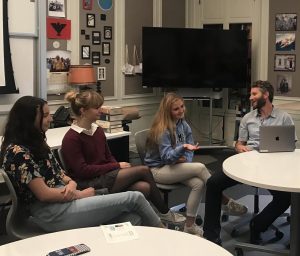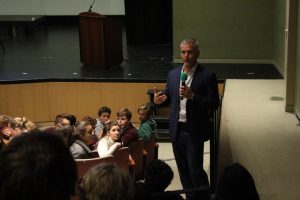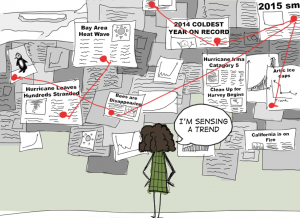Individual impact matters
Small changes make a difference
Gabriella Vulakh and Gray Timberlake
Everyone has a carbon footprint. Calculating your individual carbon footprint allows you to take steps to decrease it.
October 7, 2019
The Global Climate Strikes two weeks ago helped many individuals realize that they can participate in promoting environmental issues at the local level and individually take action to reduce their carbon footprint.
“Everything that we do has an impact on the ecosystem in ways we can’t even imagine,” senior Estie Seligman said. “My love for nature and for trees makes me want to do whatever I can to protect the environment.”
Seligman brings a reusable metal plate, utensils and water bottle to the cafeteria every day instead of eating off the single-use compostable plates.
“I like to think that when I show up to the cafeteria every day with my metal tray, everybody sees it and realizes how easy it is,” Seligman said. “All I had to do is throw it in my backpack and bring it to school. The changes that we have to make don’t have to change our whole lives. There are really small things you can do that will make a difference.”
Seligman also recently decided to become vegan, saying she was inspired to change her diet after learning about the large carbon impact of meat that uses significant amounts of land and fertilizers necessary to maintain animals.
“I did some calculations and learned that the carbon footprint of my family is 1000 trees per year — I can’t even envision 1000 trees,” Seligman said. “There are people all over the world who actually need the resources that trees provide and make their livelihood off of the land. It doesn’t feel very fair that I have the power to destroy that.”
A carbon footprint, the evaluation of green-house gas emissions of a product, is easily calculated for individuals using an online carbon footprint calculator. CoolClimate Network Director Chris Jones was the first person to create a comprehensive online tool to calculate a household’s or business’ carbon emissions in 2005.
“I was quickly becoming freaked out about climate change and was shocked by the huge gaping holes in research, activism and projects,” Jones said. “I thought, ‘How can you have policy if you do not know where your emissions are coming from?’”
The carbon calculator began as Jones’ master’s project at the University of California Berkeley and was inspired while he was on a boat in the Brazilian Amazon. The CoolClimate Network allows individuals to measure the emission of their household or business through inputting data about energy usage, food, travel, income and shopping habits.
Once the calculator synthesizes an individual’s results, it generates a personalized climate action plan based on the inputted details.
“Engaging in activism helps people take responsibility for their daily actions,” Jones said. “People often think, ‘Do my individual actions really make a difference?’ and the answer is that with the multiple spheres of influence we each have — our parents, peers, community and even national policy makers — hopefully our individual actions will lead to a collective action.”
Calculating a carbon footprint forces individuals to find climate actions that they can commit to, according to Brian Reyes, a Climate Sustainability Analyst at the San Francisco Department of the Environment.
“These issues have to be at the top of the mind,” Reyes said. “We should make these actions personal.”
SF Environment provides ways to advance climate protection and enhance individuals’ quality of life. The agency is planning for San Francisco to
accelerate emission reductions by 2030 and reach zero net emissions by 2050, according to Reyes.
“We deliver this mission to the public by taking the lead on climate action, promoting community health, strengthening our community resilience, and eliminating waste, all while amplifying the community to take action in these key delivery areas,” Reyes said.
One such community event is the California Coastal Commission’s Coastal Cleanup that Convent & Stuart Hall participated in on Sept. 21.
From volunteering at local events to creating small behavior changes, each action makes an impact and can help reduce an individual’s carbon footprint.
“Figure out what you’re passionate about first,” Seligman said. “When you really care about something, it will be easy to make changes in your lifestyle for the future of the planet.”













